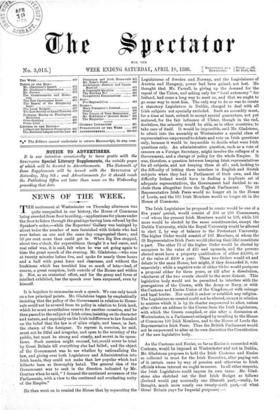He then went on to remind the House that by
separating the Legislatures of Sweden and Norway, and the Legislatures of Austria and Hungary, power had been gained, not lost. He thought that Mr. Parnell, in giving up the demand for the repeal of the Union, and asking only for "local autonomy" for Ireland, had come a long way to meet us, and that we ought to go some way to meet him. The only way to do so was to create a statutory Legislature in Dublin, charged to deal with all Irish subjects not specially excluded. Such an assembly must, for a time at least, submit to accept special guarantees, not yet matured, for the fair influence of Ulster, though in the end, doubtless, the minority would be able, as in other countries, to take care of itself. It would be impossible, said Mr. Gladstone, to admit into the assembly at Westminster a special class of representatives empowered to debate and vote on Irish questions only, because it would be impossible to decide what were Irish questions only. An administrative question, such as a vote of censure on a Foreign Secretary, might involve the collapse of a Government, and a change of policy for the whole Empire. It was, therefore, a question between keeping Irish representatives for all subjects, and not keeping them at all ; and, looking to the difficulty of letting them interfere in English and Scotch subjects when they had a Parliament of their own, and the difficulty Ireland would have in finding a duplicate set of adequate representatives, the Government had decided to ex- clude them altogether from the English Parliament. The 28 Representative Irish Peers would no longer sit in the House of Lords, and the 103 Irish Members would no longer sit in the House of Commons.


































